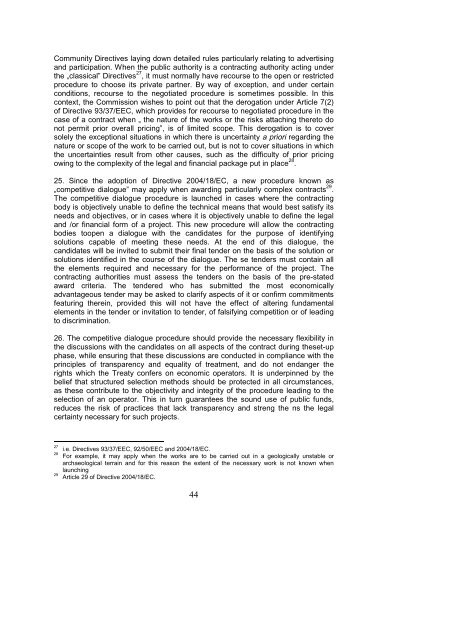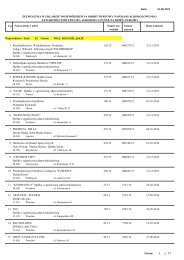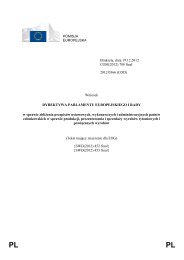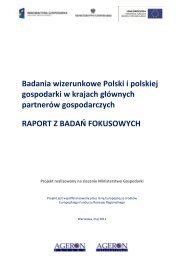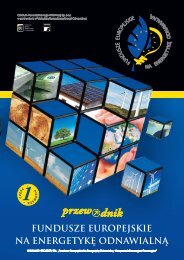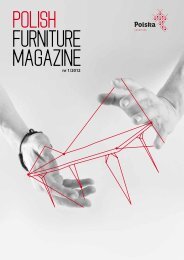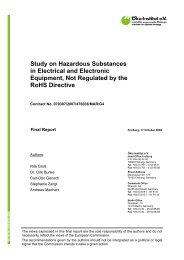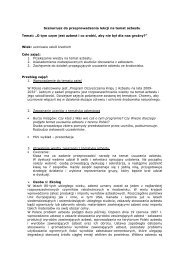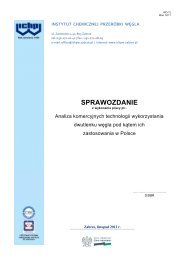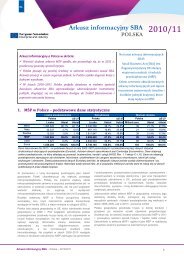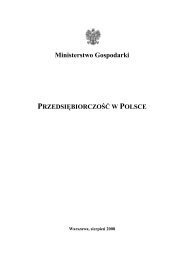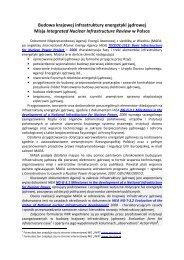Zielona księga w sprawie partnerstw publiczno-prywatnych i prawa ...
Zielona księga w sprawie partnerstw publiczno-prywatnych i prawa ...
Zielona księga w sprawie partnerstw publiczno-prywatnych i prawa ...
You also want an ePaper? Increase the reach of your titles
YUMPU automatically turns print PDFs into web optimized ePapers that Google loves.
Community Directives laying down detailed rules particularly relating to advertising<br />
and participation. When the public authority is a contracting authority acting under<br />
the „classical” Directives 27 , it must normally have recourse to the open or restricted<br />
procedure to choose its private partner. By way of exception, and under certain<br />
conditions, recourse to the negotiated procedure is sometimes possible. In this<br />
context, the Commission wishes to point out that the derogation under Article 7(2)<br />
of Directive 93/37/EEC, which provides for recourse to negotiated procedure in the<br />
case of a contract when „ the nature of the works or the risks attaching thereto do<br />
not permit prior overall pricing”, is of limited scope. This derogation is to cover<br />
solely the exceptional situations in which there is uncertainty a priori regarding the<br />
nature or scope of the work to be carried out, but is not to cover situations in which<br />
the uncertainties result from other causes, such as the difficulty of prior pricing<br />
owing to the complexity of the legal and financial package put in place 28 .<br />
25. Since the adoption of Directive 2004/18/EC, a new procedure known as<br />
„competitive dialogue” may apply when awarding particularly complex contracts 29 .<br />
The competitive dialogue procedure is launched in cases where the contracting<br />
body is objectively unable to define the technical means that would best satisfy its<br />
needs and objectives, or in cases where it is objectively unable to define the legal<br />
and /or financial form of a project. This new procedure will allow the contracting<br />
bodies toopen a dialogue with the candidates for the purpose of identifying<br />
solutions capable of meeting these needs. At the end of this dialogue, the<br />
candidates will be invited to submit their final tender on the basis of the solution or<br />
solutions identified in the course of the dialogue. The se tenders must contain all<br />
the elements required and necessary for the performance of the project. The<br />
contracting authorities must assess the tenders on the basis of the pre-stated<br />
award criteria. The tendered who has submitted the most economically<br />
advantageous tender may be asked to clarify aspects of it or confirm commitments<br />
featuring therein, provided this will not have the effect of altering fundamental<br />
elements in the tender or invitation to tender, of falsifying competition or of leading<br />
to discrimination.<br />
26. The competitive dialogue procedure should provide the necessary flexibility in<br />
the discussions with the candidates on all aspects of the contract during theset-up<br />
phase, while ensuring that these discussions are conducted in compliance with the<br />
principles of transparency and equality of treatment, and do not endanger the<br />
rights which the Treaty confers on economic operators. It is underpinned by the<br />
belief that structured selection methods should be protected in all circumstances,<br />
as these contribute to the objectivity and integrity of the procedure leading to the<br />
selection of an operator. This in turn guarantees the sound use of public funds,<br />
reduces the risk of practices that lack transparency and streng the ns the legal<br />
certainty necessary for such projects.<br />
27 i.e. Directives 93/37/EEC, 92/50/EEC and 2004/18/EC.<br />
28 For example, it may apply when the works are to be carried out in a geologically unstable or<br />
archaeological terrain and for this reason the extent of the necessary work is not known when<br />
launching<br />
29 Article 29 of Directive 2004/18/EC.<br />
44


